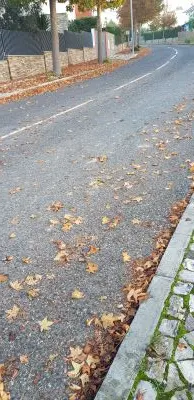Around this time, in early winter when the leaves are falling, I become a joyful wanderer, carrying large bags and walking around the neighborhood collecting fallen leaves. I can't help but think that perhaps the neighbors secretly hope I'll come their way. After all, I'm sweeping up the leaves so neatly!
I've always been a huge fan of mulching. It's a wonderful method to achieve a tidy and visually appealing landscape. You've probably seen soil that's neatly covered with materials like bark or stones of various sizes. In urban gardens, mulching is taken to an artistic level with the use of colored stones, creating diverse patterns for decorative purposes. However, I am not particularly fond of mulching with rocks or any inorganic materials since those materials don't provide beneficial organic matter to the soil.
I am a bit obsessed with microorganisms. Whether they exist within our bodies or in the soil, I'm convinced they are truly important beings. Isn't it fascinating to see plants in fields or mountains just thrive without someone constantly watering them or providing regular nutrient supplements? And when we look at those trees that can withstand scorching summers and freezing winters, don't we become curious? I find the answer to these wonders in nature's act of dropping leaves to cover the ground and protect soil microorganisms like a blanket. Yes, the fallen leaves may become a nuisance by scattering all over the place with wind and look messy, but for me, they are incredibly grateful beings. They are the guardians, looking out and protecting the microorganisms beneath them, which work hard to decompose and break down organic matter into nutrients in forms that plant roots can actually absorb. They provide not only valuable nutrients but also act as caretakers for the microorganisms, making them invaluable friends.
Let's briefly look at some key benefits of mulching:
1. Temperature control:
Microorganisms are known to be very sensitive to sudden temperature changes. By applying mulch to the soil, it helps stabilize the temperature throughout the year.
2. Moisture control:
Microorganisms, as well as earthworms, require appropriate moisture levels to thrive and reproduce. Mulching can significantly reduce water evaporation, so it can play a crucial role in maintaining optimal moisture levels.
3. Organic matter supply:
Organic materials such as wood chips, sawdust, straw, fallen leaves, and bark contain valuable nutrients. When these materials decompose, they become a nutritious food source for microorganisms. Conversely, microorganisms accelerate the decomposition process of organic materials.
4. Weed suppression:
When mulch is applied to a sufficient height, it can block light and inhibit the growth of unwanted weeds. However, let's face it, a garden without weeds will be impossible. I think we have to accept a certain amount of coexistence. Weeds also contain valuable nutrients, so when I pull them out by hand, I always reuse them as mulch. Of course, after cutting off the roots to prevent them from going back into the soil.
In reality, I am dedicated to mulching throughout the year. I collect coffee grounds from a nearby café and carefully scatter them thinly on the soil, ensuring they are evenly distributed without clumping. It feels like providing a special meal to the microorganisms. In addition, after mowing the lawn, I gather the grass clippings and use them to cover the garden as well. But, I am careful not to cover the soil too thick. The soil needs to breathe, otherwise, the grass clippings can become compacted and start to rot. Good airflow is essential. Occasionally, unwanted grass may sprout from the grass clippings, but I can manage this by periodically removing them by hand. No big deal.
Through mulching with various materials, I can supply a diverse range of nutrients to the microorganisms and the pH of the soil can also be affected depending on the materials I use. I find that larger materials like bark take longer for the microorganisms to decompose. So I prefer the material in smaller size.
As I mentioned before, I hardly use chemical fertilizers. When I protect and encourage these lovely microorganisms, I don't feel the need for them. I am an economical gardener after all!



